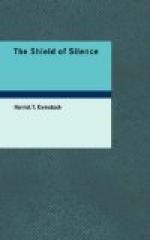“Yes!”
To see Emily Tweksbury smoke was about as incongruous as to see an antique remodelled to bring it up to date; but the smoke calmed her.
“You will call with me upon her, won’t you, Ken?”
“With pleasure.”
Raymond felt that any compromise would be well to offer.
“I’ll do my best by her, too, Aunt Emily. I rather shy at perfect types; girls, at the best, make me skittish. They make me think of myself and then I get gawky.”
“You’ll forget yourself when you see Nancy Thornton.”
“Nancy—queer old name for a modern girl!” The two puffed away like old cronies—Raymond had got into a chair now and Mrs. Tweksbury had relaxed, also.
“She isn’t modern!”
“No? What then, Aunt Emily?”
“Ken, she’s just woman. She appears just once so often, like a prophet or something, that keeps your faith alive. She’s the kind that the Bible calls ‘blessed,’ and if she didn’t reappear now and then I think the race would perish.”
“Ugh!” grunted Raymond. Then added: “Calm down, Aunt Emily, go slow. When you lose your head you’re apt to buck.”
Mrs. Tweksbury laughed at this and helped herself to another cigarette.
It was a week later that Raymond met Nancy at his aunt’s dinner table. He knew she was coming. At least he thought he knew—but when he saw her he felt that he had not expected her at all.
It was a small party: Doris Fletcher, Doctor Martin, young Doctor Cameron, and Nancy.
Nancy came into the dim old drawing room behind young Cameron. It was that fact that attracted Raymond first. He recalled what Mrs. Tweksbury had said about the type being the ideal of man—or something like that—and Cameron, whom he had just met a few weeks before, had apparently got into action.
After Nancy came Doctor Martin—it was as if the male element surrounded the girl.
She was rather breath-taking and radiant. She wore a coral-pink satin gown, very short and narrow. Her pretty feet were shod in pink stockings and satin slippers. Her dainty arms and neck were white and smooth, and her glorious fair hair was held in place by a string of coral beads.
There are a good many platitudes that are really staggering facts.
“Caught on the rebound,” is one.
Raymond was more open to certain emotions than he had ever been in his life. He was sore and bruised; he had lost several beliefs in himself—and was completely ignorant of the big thing that had given him new strength.
He had had the vision of passion through the wrong lens; he had been blinded by the close range, but he knew what the vision was. In that he had the advantage of poor Joan.
His youth cried out for Youth; he wanted what he had all but lost the right to have. But he in no sense just then wanted Nancy; it was what she represented. She was what Mrs. Tweksbury had said, the kind of girl that men enshrine in their souls and never replace even when they gladly accept a substitute.




